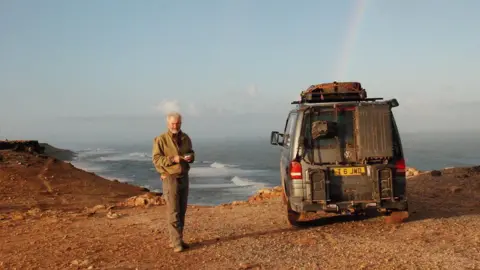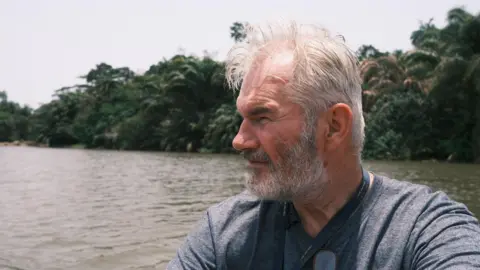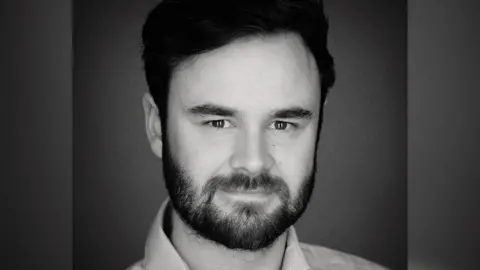A year-long solo drive through Africa – with Parkinson's
 Rob Hayward/Channel 4
Rob Hayward/Channel 4The "grit and determination" of a former Army officer with Parkinson's who drove the length of Africa – nearly entirely alone – has been captured by a Bristol filmmaker.
Guy Deacon CBE, 60, travelled18,000 miles from his home in Dorset to Cape Town in a VW campervan, and was joined four times by Rob Hayward and his camera.
Father-of-two Mr Deacon, who was diagnosed in 2010, completed the journey over a year despite having to take dozens of pills every day and experiencing a severe decline in mobility.
Mr Hayward's film, World's Toughest Drive: An African Adventure, airs on Channel 4 on Thursday 10 April at 23:00 BST, the night before World Parkinson's Day.
 Rob Hayward/Channel 4
Rob Hayward/Channel 4The one-hour film, which includes footage from Mr Deacon's video diary, is designed to demonstrate the difficulties of living with Parkinson's in Africa, where many with the condition are ostracised.
Mr Deacon planned the journey after decades serving in the Army, with much of his time spent in Africa.
He initially set off in November 2019 but was forced to return home due to the pandemic, resuming and completing his journey in 2022.
His travels took him along the west coast of Africa, through 25 countries, where he encountered illegal checkpoints, extreme weather and terrible road conditions – which no doubt contributed to the 19 breakdowns he had to resolve.
Mr Deacon often camped alone in the jungle or in remote spots hundreds of miles from civilisation.
'Hairy, hairy moments'
"He's just a very tough, tough bloke who just keeps going," Mr Hayward told BBC Radio Bristol.
"Even if things take him a long time, he still manages to make it through."
Asked how Mr Deacon got through the experience, Mr Hayward said: "Through pure grit and determination."
The documentary, Mr Hayward said, was made with a "fly on the wall" approach, with a camera stored under the gear stick and produced whenever a situation arose.
While there were "some hairy, hairy moments where we definitely locked the doors", he said, the people they met were "generally very friendly".
 Rob Hayward
Rob HaywardThe fastest growing neurological condition in the world, Parkinson's causes symptoms including tremors, slow movement and stiff muscles, and progressively damages parts of the brain.
Awareness of the condition has grown in recent years with several celebrities, including Back to the Future's Michael J Fox, opening up about their diagnosis.
Stigma attached to Parkinson's, however, still exists in the UK and abroad.
"In Africa, the problem with it is that a lot of people are ostracised from society because they believe it's contagious," said Mr Hayward.
"Some areas of Africa believe it's the work of the devil, witchcraft and so people are locked away with no medication."
On a personal level, he added, watching Mr Deacon struggle with parts of the journey was "incredibly tough".
But he said he understood why Mr Deacon "wanted to show the world how horrendous this disease is – and why he's so desperate to find a cure for future generations".
Follow BBC Bristol on Facebook, X and Instagram. Send your story ideas to us on email or via WhatsApp on 0800 313 4630.
